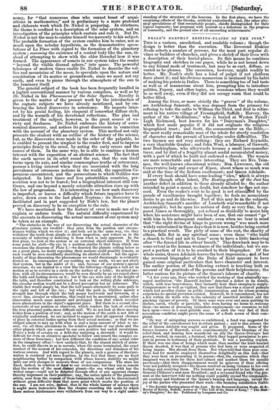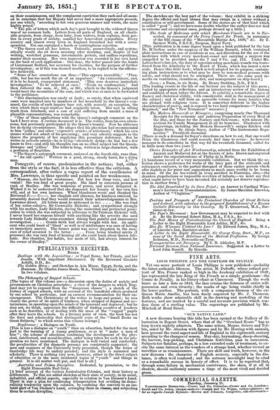NEALE'S EARTHLY RESTING-PLACES OF THE JUST. *
Tins is a various, aneedotical, and readable volume ; though the design is better than the execution. The Reverend Erskine Neale selects a number of persons, for the most part regular di- vines or builders of churches, and gives a sketch of their lives with a description of their burial-places. By this means he combines biography and sketches in one paper, while he is not bound down to any formal mode of treatment, but may be as curt, diffuse, or varied as he pleases. The execution, however, -might readily be better. Mr. Neale's style has a kind of pulpit if not platform force about it; and his obvious mannerism is increased by his habit of making his points in Italics. There is something too of bad taste as well as of mannerism about him, prompting him to introduce politics, Popery, and other topics, on occasions where they would be as well away, even if they did not occupy room that could be better filled.
Among the lives, or more strictly the " graves " of the volume, are Archbishop Sancroft, who was deposed from the primacy for refusing to take the oaths to William the Third, and died in retire- ment in his native village of Fressingfield, Suffolk ;- Hervey, the author of the " Meditations," who is buried at Weston Eniell;" Legh Richmond, best known for his " Dairyman's Daughter,", which first made popular if it did not origmate the religious biographical tract ; and Scott, the commentator on the Bible,— the most really remarkable man of the whole for sturdy resolution of character and the pursuit of knowledge under difficulties. The two laymen are not very striking : they are Richard Reynolds, a very charitable Quaker ; and John West, a labourer, of Gawoott; near Buckingham' who afterwards became a small lace-manufac- turer, and by dint a frugality almost sordid aceumulated money, with a part of which he built and endowed a church. The women are more remarkable and more interesting. They are Mrs. Trim- mer, the well-known educational writer ; Mrs. Lawrence, the old Conservative lady and owner of Ripon, about whom so much was said at the time of the Reform excitement; and Qiieen Adelaide.
If every book should have some leading "idea," which is always present though often latent The Resting-places of the .Tu.st has another defect in addition to those already alluded to : the authoi' intended te.point a moral, no doubt, but somehow he X-aes not suc- ceed. Even the reader's wish to be good is not stimulMd by the parade of excellencies brought together ; he feels no momentary desire to go and do likewise. Part of this may be in the subjects. Archbishop Sanoroft's sacrifice of Lambeth was4.emarkable if not unexampled; but he spun his notions of duty so very fine, he op- posed James so thoroughly, yet refused so decidedly .to assist him
when his assistance might have been of use, that one cannot "go "_ with him in his subsequent conduct; even when we bear in mind - that "the right divine of kings to govern wrong" was much more' widely entertained in those days than it is now, besides being carried' to a practical result. The piety of some of the rest, the eharity of others, falls flat in any spiritual sense ; even those "who build a church to God and not to fame" seem to have a little hankering after "the fancied life in others' breath." This drawback may be to some extent in the human weakness of the individuals; but we sus- pect a portion of it is to be ascribed to their biographer. Of the whole series, Queen Adelaide leaves the best impression and of her the reverend biographer of the Duke of Kent appears to have gained some original particulars that have character and interest. The earlier portion of the folio wing extract is touching both on account of the gratitude of the persons anetheir helplessness;. the ' latter curious for its picture of the Queen's labours of charity.
"A few years ago, those who watched the working of that admirably ma- naged institution 'the Ilanwell Asylum' detected a defect in its details, which, with true benevolence, they instantly bent their energieto supply. Compassionate as well as vigilant, they saw that there was a class of patients, which had peculiar claims on public commiseration, and for whose pressing, exigencies no special provision existed. Hanwell, be it remembered, has not a few within its walls who to the calamity of unsettled intellect add the pinching rigours of poverty. Of these some were ever and anon quitting its shelter, cured, wholly or partially, who from having no home to,„welcome them—no means of procuring immediate employment—no resources to fall back upon—were in a most pitiable case. To such the very fad of their necessitous condition might prove the cause of a fresh access of their com- plaint. "By way of mitigating sorrows so embittered, a fund was suggested for the relief of the convalescent but destitute patient ; and to this scheme the aid of Queen Adelaide was sought and given. It prospered. Some of the former inmates of Hanwell, aware experimentally of the blessings of-the relief-fund, and hearing how munificent an ally the Queen-Dowager had proved, worked, in concert, a footstool, which they begged permission to pre- sent in person in testimony of their gratitude. It was a puzzling request.. If there was one class of beings which more than another the kind-hearted- Queen dreaded, it was that of persons who had been or were suspected of,. being insane. She shrank from them. But when told that these poor crea- tures had for months employed themselves delightedly on this task—thar they were bent on presenting it in person—that, the reception which they _ imagined was in store for them had calmed and soothed them for months previously—that their disappointment would be grievous if their offering were not publicly accepted—the Queen resolved on doing violence to her own feelings and receiving them. The footstool was presented to her Majesty at , General Clitheroe's seat near Brentford ; and a reverend friend-who-wa,s pre- sent at the interview told me nothing could possibly exceed the compaSsion- ate courtesy and kindness of the Queen's bearing and language, except the' joy of the parties who presented their work—the beaming satisfaction visible: • The Earthly Resting-places of the Just. Ilya* Reverend Erskine Neale, M..114- Rector of Rirton Suffolk, Author of "The Life of the Duke of Rent"" The
Bilk-
op's Daughter," le. Sm. Published by Longman and Co.
on their countenancea, and the complacent conviction they each seem- ed to entertain that her Majesty had never had a more appropriate present, nor one which, according to her own gracious manner and words, she more highly prized.' "The pile of letters which each day's post brought to the widowed Queen was of no common bulk. Letters from all parts of England, on all charit- able projects, from clergy, from laity, from widows, from orphans, from par- ties in every grade of society, assailed her benevolent sympathies. Every country and almost every town in England furnished her with a corre- spondent. Not one sustained a harsh or contemptuous rejection. "The Queen read all her letters. Patiently, perseveringly, and system- atically would she sit down morning after morning, and, despite of bad writing, wretched grammar, interminable periods, and endless repetitions, master their meaning. Her own impression was recorded in her own hand on the back of each application : this done, the letter passed into the hands of lieutenant Bedford her secretary for charities, for the purpose of further investigation ; or if this was deemed needless, to be replied torn the affirma- tive forthwith.
"Some of her annotations ran thus—' This appears incredible.' 'Plau- sible, but has too much the air of an imposture.' 'An extraordinary, and, it is to be feared, exaggerated statement.' 'This case deserves immediate investigation.' 'To be relieved at once.' 'Needs no confirmation.' And then followed the sum, 51., 101., or 20/., which in the Queen's judgment would meet the necessities of the case, and which was at once to be forwarded to the petitioner.
"Her discrimination was rarely at fault; so rarely, that when equivocal eases were inquired into by members of her household by the Queen's com- mand, the results of such inquiry bore out, with scarcely an exception, the view which their royal mistress had originally taken. Her tact in sifting truth from falsehood, and a case of real suffering from amidst a mass of plausible representations, was remarkable.
"One of these applications with the Queen's autograph comment on the back I have seen. A curious document it is. The writer, from his own admis- sions, had previously participated in the Queen's bounty. Now he addresses her in dying circumstances. He alleges that his physician had recommended to him jollies,' and other expensive articles of nutriment,' which his own meens would not admit of his procuring ; and very adroitly suggests to the Queen the propriety of her supplying this pecuniary deficiency. But he writes in articulo mortis—he is dying—absolutely dying—he has but a few hours to live—and still his thoughts run on no other subject but the Queen- Dowager and jellies: The letter is long, written in large characters, with a profusion of flourishes.
'The Queen's autograph comment, endorsed on the fourth side' runs thus. "An odd epistle! Written in a good, strong, steady hand, for a dying
A.'
Panegyric, of course, predominates in the notices; but, either from the style or the fact, it is less effective than the criticism. A correspondent, after rather a vague report of the excellencies of Mrs. Laivrence, is thus specific and pointed on her weaknesses.
"Human, she had her weaknesses. But how few these were, and how venial! She was fond of great people. She liked to entertain persons of rank at Studley. She was tenacious of power, and never delegated it. Wished it to be understood that she dispensed her bounty of her own free will, and at her own instance. When blunderers wrote and thanked the
Reverend J— her chaplaiii and almoner, for kindness roteived, he invariably desired that they would transmit their acknowledgments to Mrs.
Lawrence direct. All letters must be addressed to her She was fond of her sailor-relative, Sir Cornwallis Ricketts; and sympathized strongly With his mother, Lady Ricketts, during the unmerited and protracted perse- cution to which she was subjected in reference to Sir Tristram Ricketts' will. I never heard her express herself with anything like the severity she used towards Lady Ricketts' cross-examiner during that painful and unnecessary
investigation Gentle birth had always weight with her. An appli- cant who could boast of blood' as well as of misfortunes was sure of having an immediate answer. The former point was never forgotten in the mea- sure of relief accorded to the latter From being kindred spirits (I presume) she was very fond of hearing all she could learn about Queen Ade- laide. Her charities, her habits, her mode of life, had always interest for the owner of Studley."



























 Previous page
Previous page